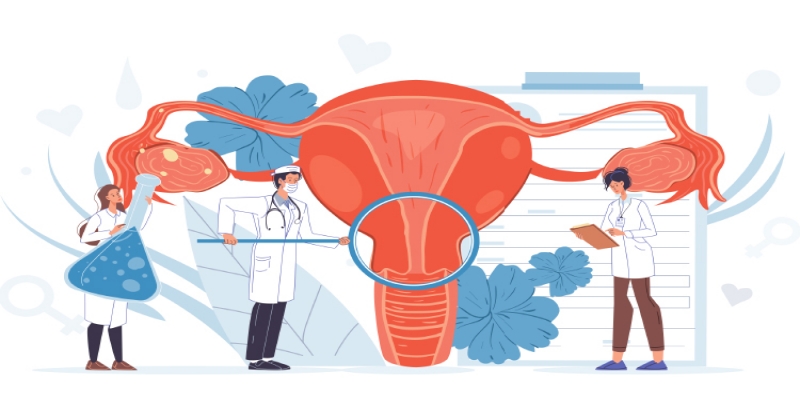The Best Foods to Improve Uterus Health
2024-10-14 / RG STONE HOSPITAL / Female Urinary Incontinence

Introduction
The health of the female reproductive system, particularly the uterus and ovaries, is crucial not only for fertility but also for overall well-being. While medical interventions play a significant role in managing reproductive health issues, nutrition is an often underestimated factor that can significantly impact uterine and ovarian function. This comprehensive guide explores evidence-based dietary recommendations to support optimal reproductive health.
The Relationship Between Nutrition and Reproductive Health
Research has consistently demonstrated a strong correlation between dietary habits and reproductive health outcomes. Key nutritional factors influencing uterine and ovarian health include:
-
Hormonal balance regulation
-
Inflammation modulation
-
Oxidative stress reduction
-
Cellular repair and regeneration support
-
Optimal blood flow promotion
Understanding these mechanisms allows for targeted nutritional interventions to enhance reproductive health.
Essential Nutrients for Uterine and Ovarian Health
1. Iron
Iron deficiency is prevalent among women of reproductive age and can significantly impact menstrual health and fertility. Optimal iron intake supports:
-
Healthy endometrial lining development
-
Efficient oxygen transport to reproductive tissues
-
Regular ovulation
Recommended sources: Lean red meat, poultry, fish, legumes, and fortified grains. Pair with vitamin C-rich foods to enhance absorption.
2. Folate
Folate, a B-vitamin crucial for DNA synthesis and cell division, plays a vital role in reproductive health by:
-
Supporting proper cell division in the reproductive system
-
Reducing the risk of certain birth defects
-
Potentially improving ovarian function
Recommended sources: Leafy green vegetables, legumes, and fortified grains. Supplementation may be advisable for women planning pregnancy.
3. Omega-3 Fatty Acids
These essential fatty acids have anti-inflammatory properties and support reproductive health by:
-
Regulating hormone production
-
Improving blood flow to reproductive organs
-
Potentially enhancing egg quality
Recommended sources: Fatty fish (salmon, mackerel, sardines), flaxseeds, chia seeds, and walnuts.
4. Antioxidants
Antioxidants, including vitamins C and E, beta-carotene, and selenium, protect reproductive tissues from oxidative stress, which can negatively impact fertility and overall reproductive health.
Recommended sources:
-
Vitamin C: Citrus fruits, berries, bell peppers
-
Vitamin E: Nuts, seeds, avocados
-
Beta-carotene: Orange and yellow fruits and vegetables
-
Selenium: Brazil nuts, seafood, poultry
5. Calcium and Vitamin D
These nutrients work synergistically to support bone health and may also play a role in reproductive health by:
-
Regulating menstrual cycles
-
Supporting proper hormone function
-
Potentially reducing the risk of certain reproductive disorders
Recommended sources: Dairy products, leafy greens, fortified plant-based milk alternatives, and moderate sun exposure for vitamin D synthesis.
Dietary Patterns Supporting Reproductive Health
While individual nutrients are important, overall dietary patterns have a more significant impact on health outcomes. Research suggests that the following dietary approaches may benefit uterine and ovarian health:
1. Mediterranean Diet
Characterized by high consumption of fruits, vegetables, whole grains, legumes, nuts, and olive oil, the Mediterranean diet has been associated with:
-
Improved fertility rates
-
Reduced risk of endometriosis
-
Better overall reproductive health outcomes
2. Plant-Based Diets
Diets rich in plant-based foods, whether vegetarian or flexitarian, offer numerous benefits for reproductive health, including:
-
Lower inflammation levels
-
Improved hormone balance
-
Higher antioxidant intake
3. Low Glycemic Index (GI) Diets
Maintaining stable blood sugar levels through low GI foods can support reproductive health by:
-
Regulating insulin levels, which influence reproductive hormone balance
-
Potentially reducing the risk of ovulatory disorders
Nutritional Considerations for Specific Reproductive Health Concerns
Polycystic Ovary Syndrome (PCOS)
Women with PCOS may benefit from:
-
Low glycemic index diets to manage insulin resistance
-
Increased fiber intake to support hormone regulation
-
Omega-3 fatty acid supplementation for inflammation reduction
Endometriosis
Dietary strategies for endometriosis management include:
-
Anti-inflammatory diets rich in omega-3 fatty acids
-
Increased consumption of antioxidant-rich foods
-
Limiting red meat and trans fat intake
Uterine Fibroids
Nutritional approaches to support uterine fibroid management:
-
Maintaining a healthy body weight through balanced nutrition
-
Increasing fruit and vegetable intake for their anti-estrogenic effects
-
Limiting alcohol consumption
Implementing Dietary Changes: Practical Recommendations
-
Gradually incorporate a variety of colorful fruits and vegetables into daily meals.
-
Choose whole grains over refined carbohydrates.
-
Include lean proteins and plant-based protein sources in each meal.
-
Incorporate omega-3 rich foods or consider supplementation under medical supervision.
-
Stay adequately hydrated with water and herbal teas.
-
Limit processed foods, excessive sugar, and unhealthy fats.
The Importance of Professional Guidance
While dietary modifications can significantly impact reproductive health, it's crucial to approach nutritional changes under professional guidance. Individual needs may vary based on specific health conditions, genetic factors, and lifestyle considerations.
For comprehensive care and personalized nutritional advice, consulting with healthcare professionals specializing in reproductive health is recommended. Institutions like RG Hospitals offer expert gynecological services, including nutritional counseling tailored to support optimal uterine and ovarian health. Their multidisciplinary approach ensures that dietary recommendations are integrated with overall reproductive healthcare strategies, providing patients with holistic and evidence-based treatment plans.
Conclusion
Nutrition plays a pivotal role in maintaining and enhancing uterine and ovarian health. By adopting a balanced diet rich in essential nutrients and following evidence-based dietary patterns, women can significantly support their reproductive health. However, it's important to remember that nutrition is just one aspect of a comprehensive approach to reproductive wellness. Regular medical check-ups, stress management, and appropriate physical activity are equally important components of a holistic health strategy. With the right combination of nutritional support and professional medical care, women can optimize their reproductive health and overall well-being.
Categories
Hernia Repair
Appendicitis
Piles
Urological Treatment
Hernia treatment
Enlarged Prostate (BPH)
Gall Bladder Stone
Urinary / Kidney Stone
Vitamins
Indian Health Care System
Exercise
Obesity
Female Urinary Incontinence
Single Incision Laparoscopic Surgery (SILS)
Kidney Cancer
Bladder Cancer
Ovarian cancer
Nephrology
Bariatric Surgery
Kidney Function Test
Female Urology
Radiation Therapy
Alcoholic Fatty Liver
Liver disease
Gastroenterology
Kidney Disease

